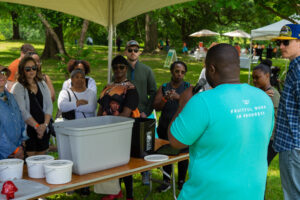Fresh food is the cornerstone of community health, fueling vitality and well-being. Unfortunately, access to fresh food is not guaranteed for all communities, including the Historic Westside. Efforts to change the landscape are at work. A partnership between the Westside Future Fund (WFF) and Food Well Alliance (FWA) is making strides by fostering education and connecting urban farmers and community growers to resource support.
The two organizations share the building at 970 Jefferson Street in English Avenue, where they work together to improve community health and wellness for Westside residents. Kate Conner, executive director of Food Well Alliance, says it only made sense that the remodeled warehouse, formerly the home of the Atlanta Community Food Bank, became their home.
“FWA was founded by Bill Bolling, the founder and longtime executive director of the Atlanta Community Food Bank. The food bank had a large community gardening program and they felt like it needed more attention under its own organization, which ultimately became FWA,” said Conner. “Bill and John Ahmann, president and CEO of the Westside Future Fund, sat down together and decided that the building needed to stay in the community and in the Westside.
When the food bank decided to sell the building, there was a once in a lifetime opportunity to keep it operating as a food resource within the community.”
Ever since, FWA has been on a mission to build a better-connected food system not only on the Westside, but throughout the Atlanta metropolitan area. The organization looks to provide more local food access to locally produced fruits, vegetables, herbs and proteins. Supporting urban agricultural education and taking care of partner farmers through direct grants and additional financial support are a part of FWA’s wrap-around services intended to connect and build healthier communities.
The Westside has a rich culture of urban farming. Several of the city’s largest urban farms – many of which have operated for decades – are located within historic neighborhoods served by WFF. As FWA works to support urban farmers, and WFF works to preserve the community’s history, the partnership is natural and necessary according to Conner.
“We need to make sure that the people of the Westside continue to be served. There is so much farming and gardening with historical roots centered on the Westside. There’s limited accessibility to grocery stores in this community and people realize a need to be more independent and sustainable in that regard.” said Conner. “It makes sense that the Food Well Alliance and what we do, supporting local agriculture, and the Westside Future Fund, who’s seeking to preserve the Westside. It’s so important as a vision for the community. We do it in different ways, but it all comes back to community wellness, housing and food.”
On May 6, FWA held its annual Soil Festival in the Westside’s Maddox Park. The event included various educational components geared toward curious new growers. It’s intended to be a fun way to learn how healthy soil leads to growing food. According to Christopher Lemons, director of programs and outreach for FWA, the event most importantly connects the local community to the organization’s mission.
“We had our partners, different organizations in the agriculture field, local vendors and farmers out to educate people about what they do,” said Lemons. “It’s almost like back in the old days when they used to do the farm and cotton expositions. It’s an opportunity for people to get together and spend some time being focused on community and food.”
Both Lemons and Conner have personal attachments to the mission of the Food Well Alliance. For Lemons, a farmer himself, the organization’s work aligns perfectly with his own life mission.
“I’ve also been a community advocate here in Atlanta for a very long time. When I joined Food Well Alliance, it was an opportunity for me to merge my skills, experience and passion for agriculture and agriculture education,” said Lemons. “It allows people to empower themselves.”
For Conner, her experience composting and gardening with her parents as a child taught her the importance of healthy soil and fresh food, and ultimately led her to work with Trees Atlanta and now FWA.
“I personally believe that the health of our community can come through soil and more importantly food and healthy food. There’s a lot of connection between community health and growing your own food or being connected to those that do,” said Conner.
In light of the growth and development occurring within the Historic Westside, FWA and WFF want to ensure that legacy residents benefit from community improvements and historic preservation efforts. They see this partnership as a positive step toward this goal.
“The heart of Atlanta lives here. There is a depth of history in this community that has truly not been explored. There’s so much here that has influenced not only Atlanta, but the world,” said Lemons. “It’s an incredible community, and we really do need to make sure that the people who live here are able to stay here and benefit as the community is developing for generations to come.”

